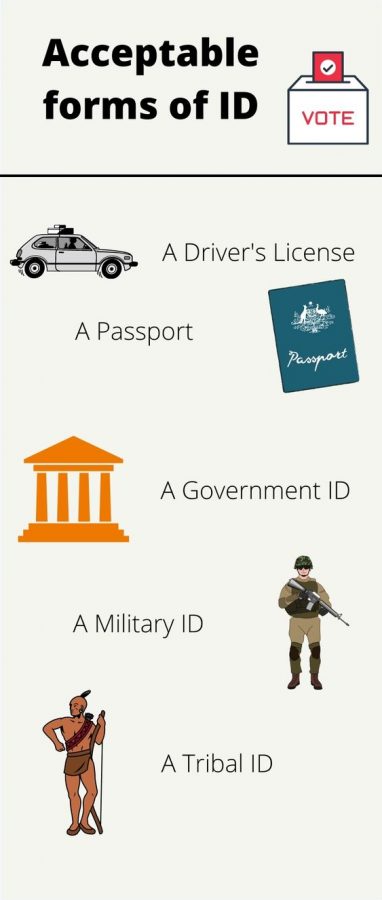Georgia Implements a New Voting Law
Georgia’s ID requirement to vote allows many forms of federal identification cards. Art created on Canva.com.
April 22, 2021
Senate Bill (SB) 202 became active after being passed by the Georgia General Assembly and being signed by Georgia Governor Brian Kemp. There are three specific aspects of the law: poll workers giving out food and drink to voters, voter ID, and Sunday voting. In response to the new law, Government and Psychology teacher Mr. Ben Peterson stated, “It’s clearly in reaction to the most recent election.”
The new law doesn’t allow poll workers, who are wearing campaign apparel, to give voters waiting in line food and drink. The reasoning behind this provision is that it will prevent the solicitation of votes. The law also makes it clear that this portion of the law doesn’t forbid voters from bringing their own water or from having access to self-serving water.
The new law also requires voters to present an ID at the polling stations. Those in opposition to the new law claim that requiring an ID to vote is a form of voter suppression, while those who support requiring an ID to vote say that it’s a way to protect our elections and to make sure that only legal citizens are voting. The law states in Section 25 that there many forms of state identification that will be sufficient [pictured above].
Mr. Peterson was divided on voter ID requirements, saying, “I’m not opposed to state IDs that show federal citizenship, but if we’re going to do this, [we’ve] got to do this carefully and [we’ve] got to make sure that it is broadly disseminated among all the people.”
The new law also allows voting on Sundays as determined by the polling station. The law states in Section 28, “Voting shall be conducted beginning at 9:00 A.M. and ending at 5:00 P.M. on weekdays, other than observed state holidays, during such periods and shall be conducted on the second and third Saturdays during the hours of 9:00 A.M. through 5:00 P.M. and, if the registrar or absentee ballot clerk so chooses, the second Sunday, the third Sunday, or both the second and third Sundays prior to a primary or election during hours determined by the registrar or absentee ballot clerk, but no longer than 7:00 A.M. through 7:00 P.M.”
People who support the new law believe that this provision is necessary in encouraging voting closer to Election Day, while others think that this portion is purposely targeting Democratic voters. Some think this because African-Americans, who vote mostly Democratic, promote voting in their churches by taking members of their congregations to the polls on Sundays.
The new Georgia voting law targets many different aspects of the state’s voting procedures, but many citizens wonder if the law will be effective in what it is trying to do. Mr. Peterson said, “I think that depends on the will of the voting public.”



